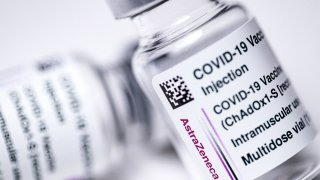
The U.S. is planning to send a combined 4 million doses of the AstraZeneca COVID-19 vaccine to Mexico and Canada in its first export of shots, the White House said Thursday.
Press secretary Jen Psaki said the Biden administration is in the process of finalizing efforts to distribute 2.5 million doses to Mexico and 1.5 million to Canada as a “loan.” The details are still being worked out.
“Our first priority remains vaccinating the U.S. population,” Psaki said at the daily briefing. But she added that “ensuring our neighbors can contain the virus is a mission critical step, is mission critical to ending the pandemic.”
The AstraZeneca vaccine has not been authorized for use in the U.S. but has been by the World Health Organization. Tens of millions of doses have been stockpiled in the U.S. should it receive emergency use authorization, sparking an international outcry that lifesaving doses were being withheld when they could be used elsewhere.
Get DFW local news, weather forecasts and entertainment stories to your inbox. Sign up for NBC DFW newsletters.
The Biden administration has said that once U.S. citizens are vaccinated, the next step is ensuring Canada and Mexico are able to manage the pandemic so the borders can reopen. That could mean more vaccines for Canada faster and a shorter wait for second doses.
“We do expect our diplomatic relationship to allow that to occur,” Canadian Procurement Minister Anita Anand told the AP recently.
Although Canada’s economy is tightly interconnected with the U.S., Washington hasn’t allowed the hundreds of millions of vaccine doses made in America to be exported until now, and Canada has had to turn to Europe and Asia.
The vaccine supply chain difficulties have forced Canada to extend the time between the first shot and the second by up to four months so that everyone can be protected faster with the primary dose. The hope is to get all adults at least one shot by the end of June.
Canadian regulators have approved the Pfizer, Moderna, AstraZeneca and Johnson & Johnson vaccines, but acquiring them has proven difficult.
Canada ranks about 20th in the number of doses administered, with about 8% of the adult population getting at least one shot. That compares with about 38% in the U.K. and 22% in the U.S.
The U.S. stockpiling of the AstraZeneca vaccine has been controversial with other allies that are also looking to halt the pandemic. The 27-nation European Union had found it difficult to approach President Joe Biden on sharing supplies of the vaccine so the disease could be stopped overseas, which would not only help save lives but also improve global economic growth.
EU member states’ ambassadors talked about the problem last week. The German government has said it contacted U.S. officials about vaccine supplies but emphasized the the European Commission is responsible for procurement.
___
Gillies reported from Toronto.



